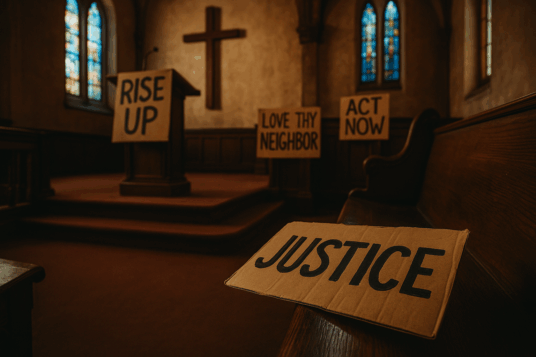False doctrine is never just an error of the mind. It changes what a church is, how it speaks, what it values, and who it becomes. Liberation theology is no exception. It doesn’t just revise theology—it reshapes the entire life of the church.
This is not a hypothetical concern. It’s what we are seeing now.
Worship Without Reverence
When liberation theology takes root, worship shifts its focus. Instead of lifting hearts to the holiness of God, songs become man-centered. Services become celebrations of human resilience, protest, and struggle. God becomes a symbol of our pain rather than the source of our peace.
The awe of God is replaced by applause for the oppressed. Lament is weaponized, not to cry out for mercy, but to point fingers. The songs change. So do the prayers. Reverence gives way to rhetoric.
Preaching Without Repentance
In many churches influenced by liberation theology, the sermon is no longer a confrontation with sin—it is a commentary on culture. Week after week, the preacher aims the message outward at systems, institutions, society, privilege, and power structures. Rarely do you hear a sermon that addresses lust, pride, selfishness, idolatry, or unbelief.
The cross is mentioned—but more as a symbol of suffering than as the place where divine wrath met divine mercy. They present Christ as a victim of state violence, not the Savior who bore our guilt. Preaching becomes therapy for the wounded and protest against the powerful—but never a summons to repent and believe.
Discipleship Without Holiness
Churches that once taught spiritual disciplines now run political book clubs. Where believers once memorized Scripture and wrestled with personal sin, they now gather to analyze privilege and power dynamics.
No one teaches young people to put sin to death. They’re taught to critique capitalism and question authority. Holiness is recast as activism. Purity is mocked. Obedience is seen as complicity. While people admire Jesus, they ignore His commands.
There is plenty of zeal, but little fruit. Plenty of passion, but no sanctification.
Community Without Accountability
In the name of solidarity, many churches abandon church discipline. Confronting sin is considered judgmental. Upholding biblical ethics—especially in areas like sexuality, gender, or marriage—is viewed as oppressive.
People live however they want, as long as they hold the correct social opinions. The church becomes a club for the aggrieved, not a family formed by truth. No one faces rebuke; instead, everyone receives applause—as long as they hate the right things.
The result? Churches filled with pain, but no healing. Anger, but no grace. Belonging, but no transformation.
Mission Without the Gospel
Churches shaped by liberation theology often pour themselves into food programs, protests, community development, and political advocacy. Those aren’t inherently wrong, to a degree. But what’s missing is the gospel.
Evangelism disappears. Apologetics becomes social critique. Short-term missions become humanitarian trips. There’s lots of activity, but no conversions. Lots of movement, but no repentance.
What good is feeding the poor if you never tell them who the Bread of Life is?
What good is building houses if you never speak of the eternal home Christ prepares for those who believe?
The church may look busy. It may win awards from virtue signalers. But it has lost its mission.
A Church Transformed Into a Political Tool
In the end, liberation theology does what every false gospel does—it steals the church from Christ and gives it to the world.
- Pastors become organizers.
- Theologians become pundits.
- Worship leaders become protest poets.
- And Christ becomes a mascot for whichever social movement is trending.
Therefore, slogans, not salvation, characterize the church.
The church doesn’t just lose doctrine when liberation theology is embraced. It loses direction. It forgets its identity. It loses the power that breaks chains of sin, heals the wounded soul, raises the dead to life, and makes enemies into brothers.
This isn’t just an error of theology. It’s a loss of the supernatural.
Because wherever the true gospel is displaced, the Spirit withdraws.
And that’s how churches die.

One response to “What the Church Loses When Liberation Theology Takes Over”
[…] Liberation Theology: What the Church Loses […]